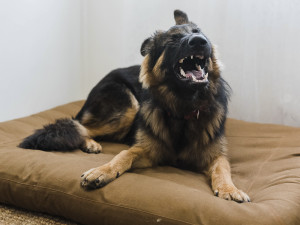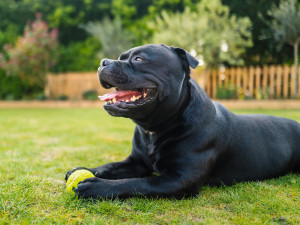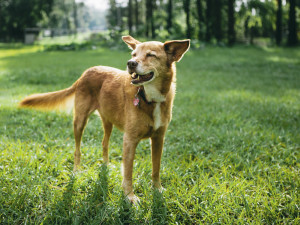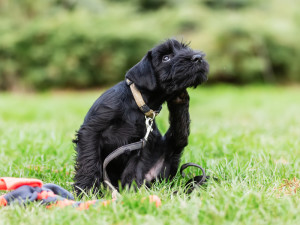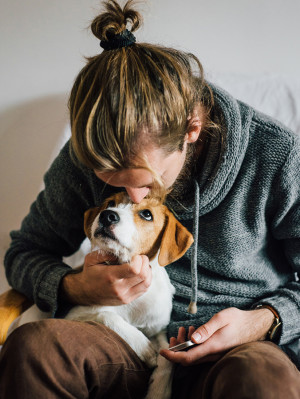Can Dogs Get Congested?
How to look out for the signs your pup is feeling stuffed up.
In This Article:
Can Dogs Get Congested? Signs of Dog Congestion Causes Of Dog Congestion When Should You See a Vet for Congestion Diagnosing Your Dog’s Congestion Home Remedies for Dog Congestion
Yes, dogs can experience nasal congestion, most commonly due to allergies, infections, or respiratory issues. When congested, dogs may exhibit changes in their breathing, often accompanied by wheezing or snorting sounds.
Can dogs get congested?
Pet parents often wonder if their dogs can get congested like people do and what to do about it. Nasal congestion is common in dogs, but it usually has a benign cause. Dogs can sound congested when sleeping, when excited, or when going about their normal activities.
Nasal congestion occurs due to swelling of the tissues in the nasal passages. This swelling is called rhinitis and may be accompanied by nasal discharge. Clearing out this discharge may help to create more space for air to flow through the congested airways, but it won’t get rid of the congestion entirely.
How much do you spend on your pet per year?
Signs of congestion in dogs
A dog who sounds congested when breathing may show other signs as well. Some common symptoms that contribute to or accompany nasal congestion in dogs include:
Nasal discharge: The swelling of the nasal passages is caused by inflammation. Inflamed airways will secrete additional fluid, which you can see externally as a runny nose. The color of the fluid can be clear, whitish, yellowish, or greenish depending on the cause.
Hard swallowing: Dogs with nasal discharge can also swallow some of their nasal secretions. Breathing in can bring fluid toward the throat, which can cause dogs to do an exaggerated gulp to help clear the back of their throat.
Reverse sneezing: It’s not too surprising if your dog sounds congested and is reverse sneezing as well. Anything that causes irritation in the back of the throat, such as post-nasal drip, can trigger episodes of reverse sneezing. Although these episodes appear dramatic, dogs are not in any danger from them.
Sneezing: Increased fluid and inflammation in the nasal cavity can also trigger sneezing, either in isolated sneezes or fits. Dogs seem to love holding their sneezes until your face is close to theirs. How else would you know they’re feeling snotty?
Snoring: Many pet parents first get concerned about nasal problems when they notice their dog snores and sounds congested when sleeping. The muscles in the back of the throat relax during sleep, making it more obvious that tissues in the area may be swollen and inflamed.
Difficulty smelling: Dogs with very swollen nasal passages may not be able to smell things as well as normal because of the decreased airflow through their nose. This can show up as a decreased interest in exploring their surroundings or possibly a decreased appetite (though dogs are better about eating despite nasal congestion than cats).
What does congestion in dogs sound like?
Every dog will sound a little different when they’re congested, depending on the degree of congestion and the shape of their nose. Severe nasal congestion can cause a dog to pant or breathe with their mouth open all the time due to trouble getting enough air in through their nose.
Swollen nasal passages can cause a wheezing sound with each breath as air accelerates through narrowed airways. This wheezing may be accompanied by gurgling, rattling, or other gross, snotty sounds if there is fluid partially obstructing the nose. In addition to the sounds made during sneezing, reverse sneezing, and snoring, dogs may also display a brief hack or gag as they swallow nasal discharge down.
Causes of congestion in dogs
After hearing any of the fun noises their dog’s stopped-up nose can make, dog parents often wonder, “Why does my dog sound congested?” There are numerous causes for nasal congestion in dogs, including:
Allergies
Seasonal environmental allergies can trigger rhinitis and nasal discharge in sensitive dogs. Dogs with allergies often have a runny nose with clear to whitish fluid or may have congestion alone.
Canine infectious respiratory disease complex (CIRD)
Commonly known as kennel cough, this upper respiratory disease referred to as CIRD can be caused by an assortment of viruses and bacteria. Vaccination will help to prevent and limit the severity of this contagious doggy cold, which usually lasts about seven to 10 days.
Other respiratory infections
Dog noses can also get nasal infections due to fungal spores they pick up from the environment. These infections are usually more persistent and severe than kennel cough. Fortunately, they’re relatively uncommon in dogs, though Golden Retrievers seem to be more susceptible than other breeds.
Anatomical abnormalities
Some dogs just seem to be permanently congested. They’re chronic snorers, snufflers, and snorters, and you can track them around your house by sound alone. Flat-faced breeds like Bulldogs, Pugs, and Boston Terriers are most predisposed to being born with abnormal nasal anatomy and can suffer from nasal congestion and difficulty breathing throughout their lives due to this.
Tumors
Masses can develop within the nose and cause partial or complete obstruction of the nasal passages. These may be accompanied by nasal discharge (sometimes bloody), or a swelling of the face. Some masses are benign and resolve with removal alone, but cancerous tumors may require chemotherapy or radiation therapy to be controlled.
Dental disease
The roots of dogs’ upper teeth sit right below their nasal passages. Tooth root infections can cause enough swelling to cause nasal congestion. Sometimes the infection will even spread into the nasal cavity, resulting in discharge as well.
Foreign objects
Dogs explore the world by sniffing everything in sight. All this sniffing can result in inhaled objects, which can cause some local irritation or infection before (hopefully) being sneezed out.
When should you visit a vet for congestion?
Running to your veterinarian every time your dog has a sniffly nose or sneezing is probably overkill. Most dogs with mild respiratory symptoms such as a little bit of nasal congestion or clear nasal discharge can wait a few days to see if it resolves on its own before you discuss it with your vet.
Some signs that your dog may need veterinary care include:
Bloody nasal discharge
Constant panting
Evidence of pain
Facial swelling
Loss of appetite
Lethargy
Inability to sleep comfortably
You should also have your vet check out any nasal symptoms that last more than a week, even if they’re mild. As always, it’s best to err on the side of caution. You know your dog better than anyone, so you should always check with your vet if you’re concerned about your pup’s condition for any reason.
Diagnosing your dog’s congestion
The causes for nasal congestion in a dog can be difficult to track down. Taking a video of what you’re seeing and hearing at home may help your vet narrow down the list of possibilities. Your vet will perform an examination to check things out. Depending on what they suspect, they may recommend watchful waiting, symptomatic treatment, or diagnostic tests.
A complete work-up for nasal congestion in dogs can be extensive. Radiographs of the head may show some changes to the bones within the nose, but a CT scan gives much more detail about the area. Rhinoscopy is a sedated procedure in which a veterinarian investigates a dog’s nasal passages with a very small video camera. In addition to visualizing the structures inside the nose, this procedure allows them to do things like take samples of abnormal tissue or remove foreign material.
How to help congested dogs at home
Your veterinarian may recommend some home-care therapies for your congested dog. One of the most common recommendations is also one of the easiest to do. Putting your dog into a small bathroom with a hot shower running for ten to fifteen minutes can help with congestion. The steam from the shower can open nasal passages and soften secretions, allowing them to run out more easily.
Dogs that are having trouble smelling may also benefit from having a little bit of warmed canned food added to their usual diet. The stronger smell can help to stimulate their appetite.
Never give dogs human antihistamines or cold medications unless specifically advised to do so by your veterinarian. Many human medications for nasal congestion are toxic to dogs and can cause heart problems, seizures, or death.
Tips for preventing dog congestion
Keep your dog up to date on vaccinations to help prevent contagious causes for nasal congestion.
Avoid letting your dog play or interact with dogs with coughing, sneezing, nasal discharge, or any other signs of illness.
Avoid known triggers if your dog has environmental allergies.
Brush your dog’s teeth regularly and follow your veterinarian’s advice for oral health care.
FAQs (People also ask):
Should I be worried if my dog sounds congested?
Most common types of nasal congestion in dogs are mild and self-limiting. Dogs with severe congestion, other signs of illness, or mild symptoms that last for more than a week should see a veterinarian for care.
Should my dog be put on medication for congestion?
Do not give your dog medication for nasal congestion unless advised to do so by your veterinarian. Many human decongestants and cold medications are toxic to dogs. Dogs will often recover from nasal congestion without the need for medication.
Can puppies get congested as well?
Puppies can get congested just like older dogs can. Depending on their age, puppies may get sicker because of their immature immune system and smaller body size.
Are certain breeds more prone to congestion?
Brachycephalic (flat-faced) breeds like Bulldogs, Pugs, Boston Terriers, and others are more prone to nasal congestion due to the abnormal structure of their face and nose. Many dogs in these breeds have chronic respiratory noise and congestion.
References:
Retrospective Study of 1,050 Dogs With Respiratory Symptoms in Japan (2005–2020)opens in new tab
Canine Model of Nasal Congestion and Allergic Rhinitisopens in new tab
Suspect Odontogenic Infection Etiology for Canine Lymphoplasmacytic Rhinitisopens in new tab
A Retrospective Study of Chronic Nasal Disease in 75 Dogsopens in new tab



